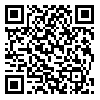BibTeX | RIS | EndNote | Medlars | ProCite | Reference Manager | RefWorks
Send citation to:
URL: http://bcn.iums.ac.ir/article-1-26-en.html
Introduction: Social inequality may have a significant negative effect on health. There are some evidences that social inequality and stressful conditions could lead to development and progression of various disorders. On the other hand, the results of some research studies have shown that reducing the consumed calorie could prolong the lifetime. In addition, limiting the consumed calorie could produce beneficial changes in the level of some hormones including blood insulin and may reduce body temperature. Meanwhile, food restriction could reduce genetic damage and may have protective effect against external toxins. Therefore, the aim of the present study was to evaluate the effect of food restriction on learning and memory of male rats using passive avoidance and Y-maze tests.
Methods: For this purpose, male Wistar rats (n = 48) were divided into control, 3 experimental, and two negative and positive control groups. Control group received normal rat regimen for 6 weeks. The group with full restriction and non-isolated received 1/3 of the food regimen. The group with full restriction and isolation received 1/3 of the food regimen. The experimental group with two-weeks food restriction and non-isolated received 1/3 of the food regimen only for two weeks. Streptozotocin-diabetic rats with blood glucose higher than 250 mg/dl was considered as negative and positive control received vitamin E (10 mg/kg/day i.p.) as an antioxidant. For evaluation of learning and memory, initial and step-through latencies and alternation behavior were analyzed using passive avoidance and Y-maze tests.
Results: Regarding initial latency, there was a reduction in diabetic, vitamin-E treated, and group with 2-weeks food restriction and there was an increase in groups with full restriction and isolated and with full restriction as compared to control. Meanwhile, there were no significant differences among the groups, indicating that there were no changes in behavior acquisition. With respect to step-through latency which indicates the ability for consolidation and recall of information, vitamin-E treated group and group with full restriction showed a slight non-significant increase as compared to control group. Diabetic group showed a significant reduction (p<0.01) in comparison with control group. Meanwhile, in groups with full restriction and isolated and with 2-weeks restriction showed a significant reduction in relation to control group (p<0.05 and p<0.01). In addition, these groups showed a significant higher index as compared to diabetic group (p<0.05). The results of Y-maze which indicated spatial memory capability of the animal showed that alternation was significantly lower in diabetic group as compared to control (p<0.01) and there was no significant differences for other groups as compared to control. On the other hand, vitamin E caused a slight increase in this regard.
Discussion: The results of this study showed that food restriction irrespective of intervention kind did not produce a significant change regarding behavior acquisition and full food restriction (non-isolated) also did not cause a significant change regarding animal ability for consolidation and recall of information in relation to control group. Meanwhile, 2-weeks restriction and full restriction with isolation caused a significant reduction in this respect. In addition, food restriction did not have an effect on spatial memory.
Received: 2009/07/27 | Accepted: 2016/08/30 | Published: 2016/08/30
| Rights and permissions | |
 |
This work is licensed under a Creative Commons Attribution-NonCommercial 4.0 International License. |





